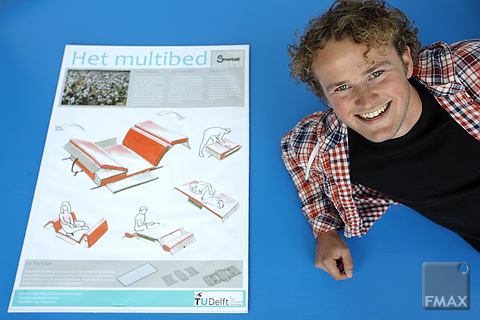Eten, drinken en een plek om te slapen. Meer heb je niet nodig om in een noodsituatie te overleven. Maar een beetje privacy is wel heel welkom. IO’er Maarten Langbroek stopte het allemaal in één ontwerp, met zelfs nog een zitje om er optimaal van te genieten.
En dan is er opeens een bommelding in Ikea, en word je geacht je met alle bezoekers op te houden in een noodruimte. Of wordt je straat ontruimd vanwege een brand en verkas je verplicht naar de dichtstbijzijnde sportzaal. Compleet met al je buren én bijbehorende kinderen. Geen rust, geen privacy, geen werkruimte – alleen een veldbedje waar geen hond een oog op dicht doet. Had nou niemand daar een oplossing voor kunnen bedenken?
Ja dus. Maarten Langbroek (23) ontwierp voor zijn bachelor-eindproject bij IO een Multibed, een inklapbaar veldbed dat is om te bouwen tot een zitje of tafeltje. Het geeft grote groepen slachtoffers van rampen net dat ene kleine beetje persoonlijke ruimte in de noodopvang. Hij maakte het in opdracht voor RS Developments, dat nieuwe toepassingen zocht voor zijn aluminium sandwichpanelen. “Ik kwam al snel op het idee voor een toepassing in noodsituaties. Na de vulkaanuitbarsting in IJsland heb ik rondgelopen op Schiphol. Al die gestrande reizigers zonder enige vorm van privacy. Die mag je wel een beetje tegemoet komen, vond ik.”
Hij probeerde verschillende inklapprincipes uit. Lastig, want bedden voor noodsituaties moeten voldoen aan bepaalde eisen. “Ze moeten bijvoorbeeld pootjes hebben”, weet de student. En dat maakte Langbroeks Multibed weer minder geschikt voor RS Developments. “Want dat wilde natuurlijk gewoon een ontwerp dat ze in eigen fabriek kan maken. Doordat mijn project scharnieren, pootjes en andere onderdelen bevat die het bedrijf niet binnenshuis fabriceert, waren de mensen daar niet uitgesproken enthousiast.” In tegenstelling tot zijn begeleiders, die de student een 7,5 gaven voor zijn eindproject. “Alleen was ikzelf niet tevreden met het eindresultaat. Ik zat een beetje vast in het ontwerpproces, dat liep al niet lekker. En achteraf had ik mijn Multibed veel beter kunnen ontwerpen voor een andere doelgroep; campings bijvoorbeeld. Dan had ik mezelf veel minder hoeven beperken, doordat ik aan minder eisen had moeten voldoen.”
Tja, ook dát kun je leren van een bachelor-eindproject. “Misschien moet ik het ooit nog eens opnieuw proberen voor een andere doelgroep. Het principe is natuurlijk heel leuk.” Eerst maar eens wat nachtjes – en een master integrated product design – over slapen. In een gewoon bed dan, en de privacy van zijn eigen kamer.
Nowadays, society as a whole is concerned with sustainability, pollution, efficiency and costs. Hence, wastage in any form is no longer tolerated, which is a fact that not only applies to the Netherlands but to the whole world, and also to educational institutions and students.
The ceremony began on a serious note. Outside the Aula the
employees’ union was protesting, armed with a street organ and banners, proclaiming that TU Delft was losing highly skilled scientific staff because the university would not offer higher wages. Inside the Aula, the president of TU Delft’s Executive Board, Dirk Jan van den Berg, had an urgent message for first-year students: ‘Get everything you can out of this’, was one of his opening lines. He spoke of a ‘difficult task’ in a world that was rapidly and irreversibly changing and in which the students must compete. And also about the good students in China and elsewhere – their competition. And about how the Netherlands was increasingly relying on knowledge and innovation – on the students then, the future engineers.
Peter Voser, CEO of Shell, the oil company, was the event’s keynote speaker. He was on hand to discuss the consequences of this ‘no-waste’ mentality for large international organizations like his company. According to Voser, there is much to be done: reducing energy use, discovering new energy sources and cutting CO2 emissions. “Because the world’s population is growing”, Voser said, “more and more people will therefore need energy for their laptops, ovens, cars….” This will all be highly reliant on technology – on the students, the future engineers.
Menno Bentveld, a Dutch television presentator, then led a panel discussion, in which, among other issues, the idea of time and time wasting were explored, with a particular focus on the responsibilities that students and the next generation of engineers must face.
Bentveld was full of praise for students as compared to the dumb outside world. You must cherish students, Bentveld said, but completing your studies could be done ‘a bit faster’ than the average of 7.2 years it takes a TU Delft undergraduates to get their degrees.
Ultimately, the first-year students received a series of strong messages. There is a lot of talent out there, but little time. No time to waste. So in which way will the new students choose to go? A good question for them to brood on during their first lectures.



Comments are closed.